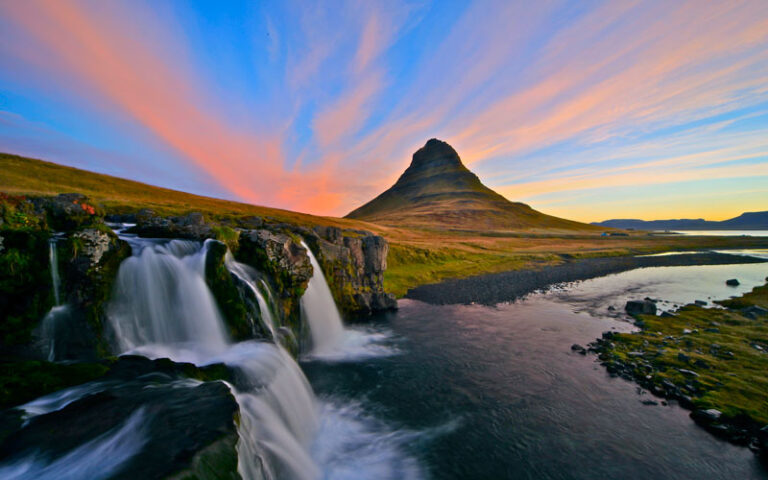Where to visit a volcano: Our guide to exploring the world’s most popular volcanoes
Volcanoes have captivated us for centuries with their powerful eruptions and fascinating geology.
In recent years, volcano tourism has been on the rise.
These powerful forces of nature attract explorers from across the globe hoping to witness mesmerising lava flows, spewing ash, and spectacular scenery.
Here are 18 dormant and active volcanoes to add to your bucket list…
Active volcanoes to visit
You can visit some of the most active volcanoes in the world! For thrill-seekers and nature enthusiasts, these are not to be missed…
Arenal Volcano, Costa Rica
- Type: andesitic stratovolcano
- 1633 metres above sea level
- Last erupted: 2010
The Arenal active volcano was formed 7,000 years ago but sparked interest in 1968 with an explosion that buried three villages and destroyed the western side of the mountain.
Until 2010, its eruptions were in constant flow, with effusions of smoke and lava happening almost daily.
Since then, the seismicity and lava flows have decreased significantly but visitors can still see plumes of ash rising from the top.
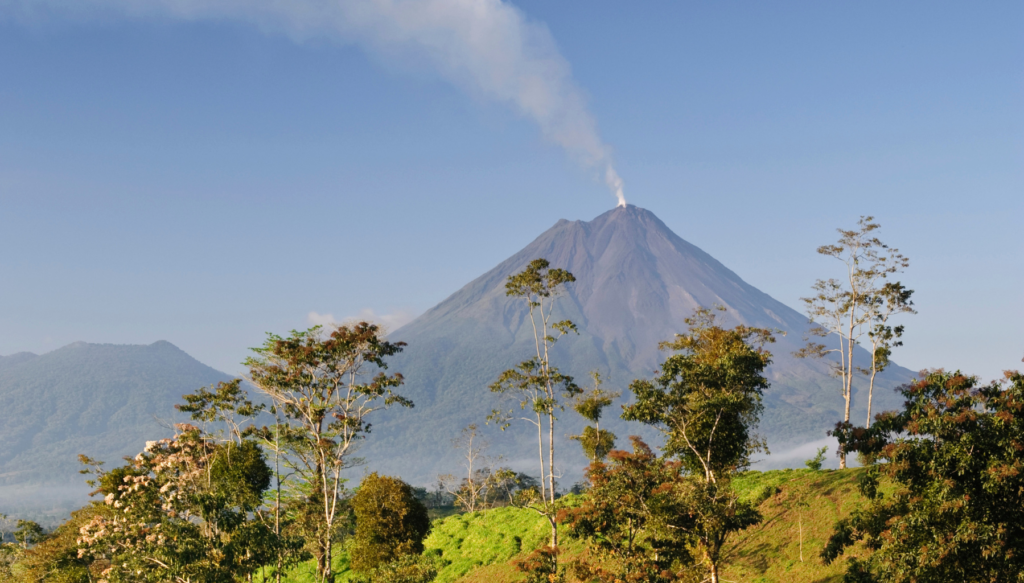
If you’re visiting the Arenal volcano, there’s lots to see and do including rainforest hikes, white water rafting and horse-riding.
Bardarbunga, Iceland
- Subglacial stratovolcano
- Altitude: 2009 meters
- Last erupted: 2014
Bardarbunga is Iceland’s second-highest mountain which erupts every 250-600 years. The active volcano lies under the icecap of Vatnajokull glacier and caused the largest eruption recorded on Earth around 8000 years ago.
Until 1864, there had been several subglacial eruptions at Bardarbunga. In more recent years, the unique Holuhraun eruption was caused by lava travelling from Bardarbunga’s magma chamber.
Today, the volcanic activity is being closely monitored but Bardarbunga is a great volcano for any budding geographers to visit due to its fascinating history.
Poas, Costa Rica
- Volcanic activity: Ended in 1954
- Elevations range from 2400 to 2709 metres
- Altitude: 2708 metres above sea level
Poas has one of the world’s largest craters and perfectly showcases the geothermal forces that formed Costa Rica. Beneath its mist, you’ll see a sulfuric green lake at the bottom that’s surrounded by steam rising from fumaroles. When pressure builds, the steam breaks through in geysers that shoot up to 250 metres high!
The last major activity was in 1910 emitting nearly a million tons of ash. Even though Poas is an active volcano, the eruptive activity ended in 1954.
Many twisted trails lead through cloud forest to Poas where you could spot exotic birds like hummingbirds and toucanets. There is also a paved trail leading to lookout points that overlook the crater.
Mount Etna, Italy
- Active Stratovolcano
- Altitude: 3,329 metres
- Last erupted: March 2017
Mount Etna has three ecological zones, each exhibiting its characteristic vegetation and is protected as a UNESCO World Heritage site and has become an obligatory tourist stop in Sicily.
The best part? A cable car can take you to 2,500 metres to save your legs!
Iceland’s Bardarbunga is an active subglacial stratovolcano, which somewhat usually sits on a constructive plate boundary, underneath Vatnajokull. This amazing picture was taken in 2014, when Bardarbunga last erupted, with the added bonus of the Aurora Borealis glowing above.
According to Greek mythology, this active volcano is the burial place for the monster Typhon, killed by Zeus and his fiery wrath is what causes the eruptions.
Since a major eruption in 2001 that lasted several weeks, Mount Etna has had a series of stromboli eruptions in 2002, 2007, 2015, 2019 and 2020 (this involves moderate bursts of expanding gasses that eject lava in cyclical small eruptions).
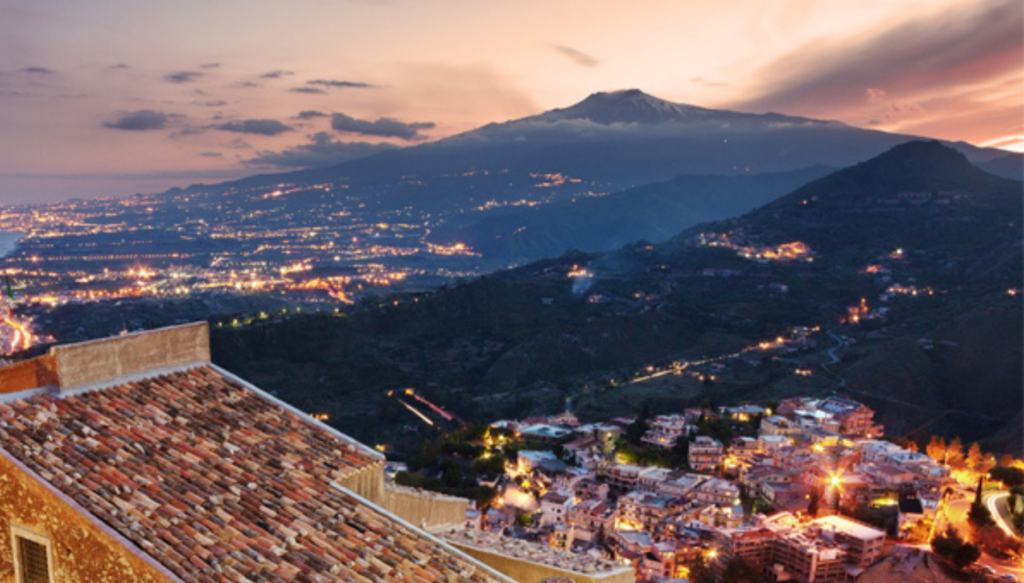
Mount Etna has three ecological zones, each exhibiting its characteristic vegetation and is protected as a UNESCO World Heritage site and has become an obligatory tourist stop in Sicily.
The best part? A cable car can take you to 2,500 metres to save your legs!
Mount Fuji, Japan
- Altitude: 3,776 metres
- Type: Stratovolcano
- Last eruption: 1707
Mount Fuji is Japan’s most iconic volcano that has erupted regularly from the beginning of recorded history (more than 10,000 years since its formation!)
It has since remained quiet for the last 300 years following the Hoei eruption in 1707.
Mount Fuji is a UNESCO world heritage site and one of Japan’s most famous tourist destinations, open to hikers from July to September.
Eyjafjallajokull, Iceland
- Type: Stratovolcano
- Last erupted: 2010
- Altitude: 1,666 metres
You may remember when Eyjafjallajokull last erupted in 2010, stopping air travel around the world with its huge ash plume.
However, this kickstarted Iceland’s tourism boom as people wanted to witness one of the few stratovolcanoes in the country.
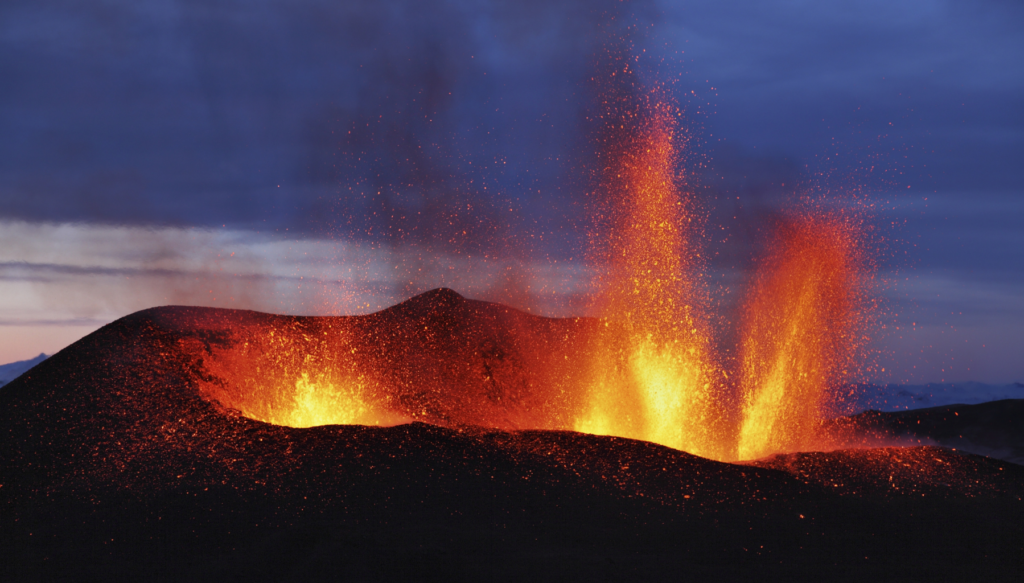
Eyjafjallajokull is an active subglacial stratovolcano which sits on a constructive plate boundary and you can hike to the eruption site.
Mount Vesuvius, Italy
- Active volcano
- Altitude: 1, 281 metres
- Age: Approx. 300,000 years old
Mount Vesuvius is the only active volcano in mainland Europe and is renowned for its devastating eruption of Pompeii and Herculaneum in 79AD.
Pompeii is now one of the largest archaeological sites in the world and a must-see for those visiting the Bay of Naples.
You can also visit the Vesuvius National Park to hike the trails and learn about the historical buildings.
Hekla, Iceland
- Last eruption: 2000
- Type: Stratovolcanoes
Mount Hekla is the most active volcano in Iceland with a fascinating story. In the Middle Ages, it was called ‘The Gateway to Hell’ due to the number of times it blasted fire and brimstone.
The legend lasted well into the 19th century when witches were said to gather at its summit during Easter.
Today, Hekla is popular with hikers who can follow the trail most of the way to the summit.
The volcano is part of a volcanic ridge in South Iceland and includes a series of craters, including two active ones.
Fagradalsfjall, Iceland
- Type: Shield volcano
- Last eruption: 2021
- Location: Reykjanes Peninsula
Bursting into life in March 2021, Fagradalsfjall captured the attention of people across the world after being dormant for 800 years.
Even though today, you may not see rivers of lava flows or magma shooting from the crater, you’ll witness a volcanic landscape with plenty of interesting landforms and an area of black solidified lava.
Hiking trails leading to the summit are available as well as guided tours and helicopter tours available to those adventurers who wish to see it for themselves.
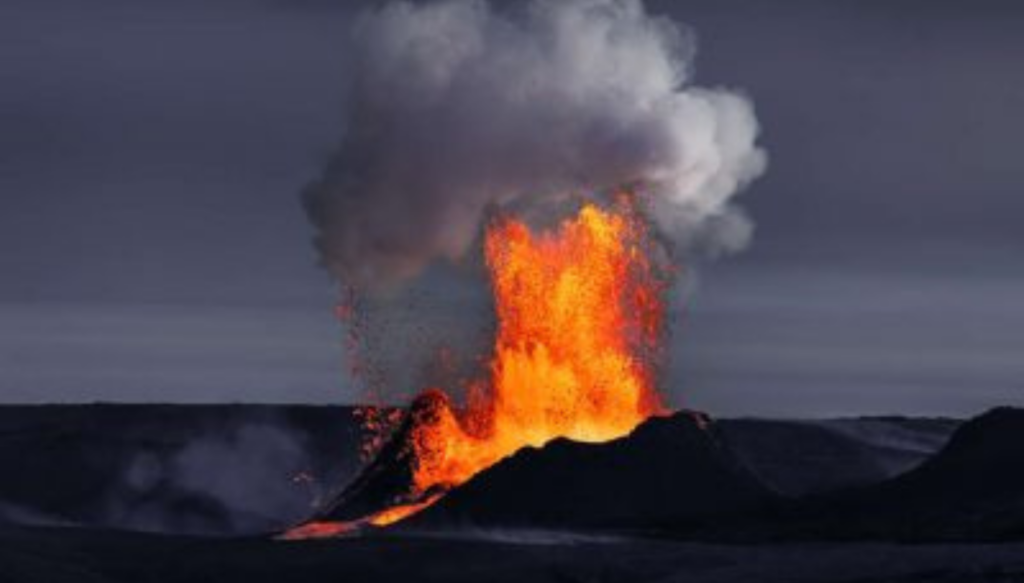
Eldfell, Iceland
- Location: Westman Islands
- Altitude: 200 metres
- Last eruption: 1973
Eldfell is known for the famous volcano eruption in 1973 that destroyed most of the nearby towns following no activity for 5,000 years.
Lava flows were heading to the harbour of Heimaey which would destroy the town’s economy so the Icelanders pumped seawater onto the lava to cool it quickly. This ingenious idea proved successful and saved the harbour.
Eldfell’s 200-metre volcanic cone is now one of Iceland’s most popular tourist destinations and it’s possible to walk up to and around the crater. You can also visit Eldheimar Museum to learn about the eruption.
Stromboli, Italy
- Altitude: 926 metres above sea level
- Erupting since 1932
- Latest eruption: 2014
Stromboli is part of one of the eight Aeolian Islands off the north coast of Sicily. Stromboli’s name is derived from the ancient Greek name ‘strongule’ because of its round swelling form.
Stromboli is one of the most active volcanoes in the world, with regular minor eruptions where glowing lava can be seen from the island, giving it its nickname ‘Lighthouse of the Mediterranean.’ Short but energetic eruptions from the summit crater regularly occur spewing ash, lava and stone blocks hundreds of metres into the air.
A great way to see Stromboli is by boat. If you’re lucky you’ll get a view of lava fireworks in the sky!
Katla, Iceland
- Last erupted: 1918
- Altitude: 1512 metres above sea level
- Type: Subglacial volcano
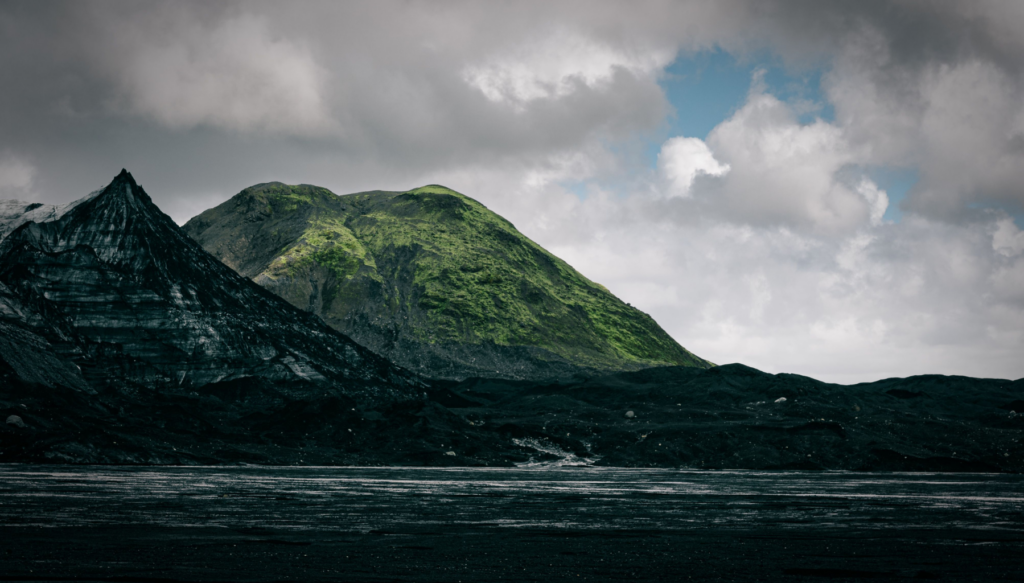
Katla translates to ‘kettle,’ very fitting as one of the world’s most active volcanoes that’s on the edge of boiling! Katla sits underneath the ice cap, Mýrdalsjökull, and previously erupted approximately every fifty years until 1918, it is long overdue!
Katla is connected to Eyjafjallajökull. Usually eruptions at Eyjafjallajökull trigger activity at Katla within the same decade. Sometimes these eruptions take place under the surface of Mýrdalsjökull’s 700 metre thick ice which causes flooding on the South Coast.
Because Katla is beneath the peak of Mýrdalsjökull, guided tours aren’t common. You can, however, spot Katla from the Ring Road travelling along the South Coast in clear weather conditions. The volcano can also be seen from the Sólheimajökull and Mýrdalsjökull glaciers.
The Lava Show in Vik is local to Katla and the show includes lots of information about the last eruption and how the town is preparing for the next one.
Hverfjall, Iceland
- Type: Tephra explosion crater
- Altitude: 420 metres
- Crater rim: Approx 1km
Hverfjall is connected to the active volcanoes system, Krafla, near Lake Myvatn. Hverfjall is a tuff ring (or tephra cone) with an impressive one-kilometre wide crater rim.
The crater was formed during a volcanic eruption around 2,800 years ago creating a landslide, giving Hverfjall the shape it has today.
You can walk up the slopes and around the crater rim to admire the otherworldly volcanic landscape and view of Lake Myvatn.
Non Active Volcanoes To Visit
Even though these are non active volcanoes, you can still experience their natural beauty and intriguing volcanic landscape. Here are some of our favourite dormant volcanoes to add to your itinerary.
Thrihnukagigur, Iceland
- Total depth: 212 metres
- Last eruption: 4,000 years ago
Thrihnukagigur is a geologist’s dream. The ‘three peak crater’ is one of a kind and has the only accessible lava chamber in the world where you can explore beautiful rock formations.
Explore the lava fields as you hike to the summit and the perfectly preserved magma formations from its violent eruption 4,000 years ago.
Capelinhos, The Azores
- Dormant volcano
- Altitude: 501 metres
- Location: Peninsula do Capelo
Capelinhos is a dormant monogenetic volcano and is considered a mystery of the vulcanology in the region as it emerged from a mixed volcanic eruption with effusive and explosive periods in the Atlantic Ocean.
At just 501 metres tall, Capelinhos is one of the lowest volcanoes on the list. Located in the Capelo Volcanic Complex, Capelinhos was the last volcano to erupt in the Azores in 1957.
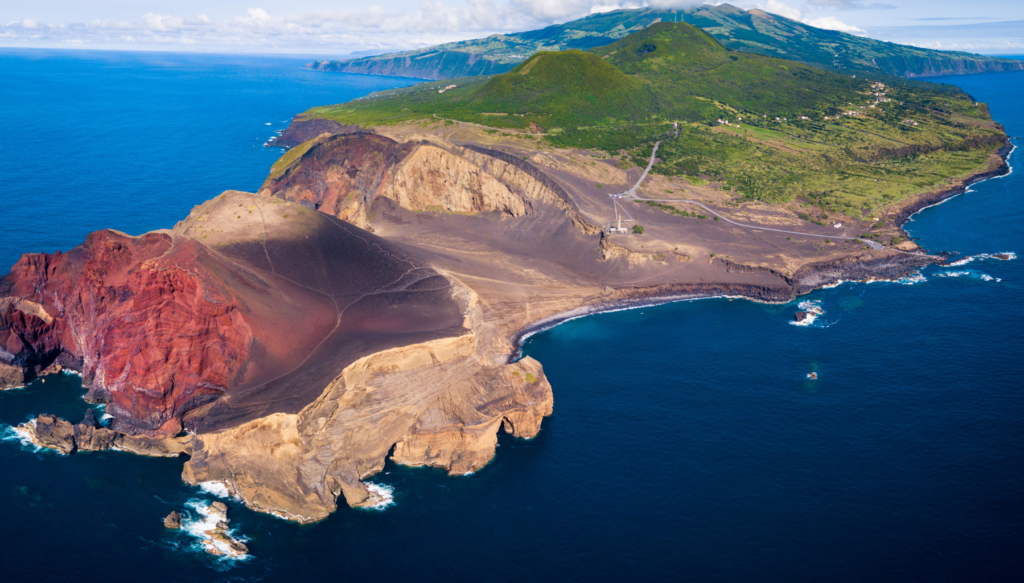
When visiting, you’ll notice the iconic lighthouse nearby which is constructed from volcanic basalt and abandoned during the eruption.
There are plenty of opportunities to explore the surrounding nature as you travel through Faial so a trip to Capelinhos isn’t one to be missed!
Thrihnukagigur, Iceland
- Total depth: 212 metres
- Last eruption: 4,000 years ago
Thrihnukagigur is a geologist’s dream. The ‘three peak crater’ is one of a kind and has the only accessible lava chamber in the world where you can explore beautiful rock formations.
Explore the lava fields as you hike to the summit and the perfectly preserved magma formations from its violent eruption 4,000 years ago.
Sete Cidades Massif, The Azores
- Dormant polygenetic volcano
- Mountain type: Stratovolcano
- Last erupted: 1880
Sat underneath a lake, the Sete Cidades Massif is a stratovolcano complex in the western part of Sao Miguel.
The stunning Lagoa das sete cidades (or “the lake of the Seven Cities”) sits at the centre of the centuries-old volcanic complex. It attracts visitors because the two lakes have different colours (blue and green) caused by the variations in volcanic minerals.
Here you’ll witness centuries worth of geological wonders including lava flows, cones and lava domes.
Vulcano, Italy
- Type: Stratovolcano(es)
- Location: The Aeolian Islands
Vulcano is a small volcanic island home to four volcanoes; Vulcano della Fossa, Vulcanello, Monte Aria, and Monte Saraceno. You can hike to the crater of Vulcano for some breathtaking views of the Aeolian Islands.
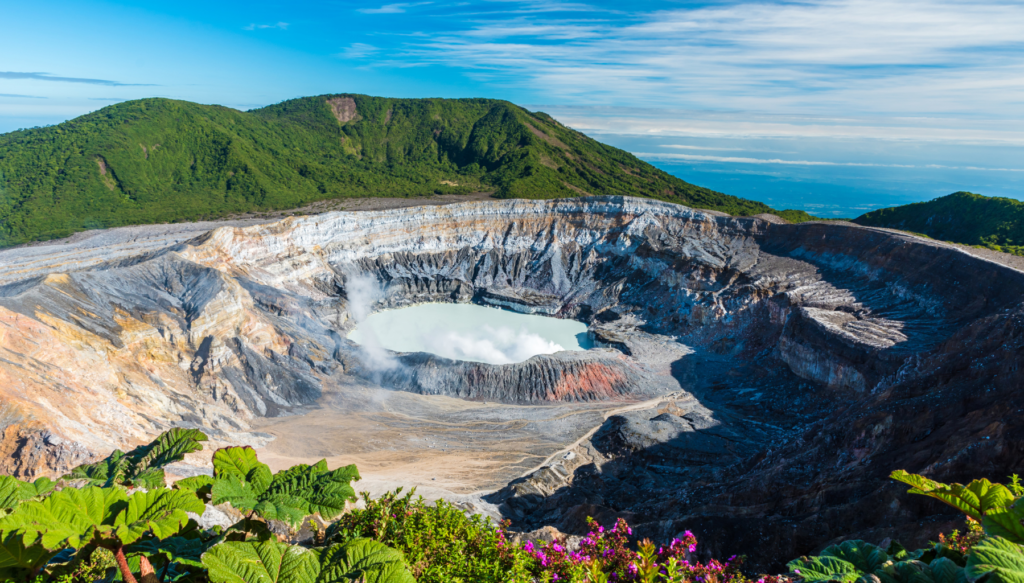
There are lots to do on Vulcano Island including exploring the Cratere della Fossa, relaxing on the beaches and experiencing the therapeutic mud baths.
Mount Pico, The Azores
- Type: Stratovolcano
- Last erupted: 1720
- Altitude: 2,351 metres
Mount Pico is not just the highest peak on Pico Island in the Azores, but all of Portugal and the Mid-Atlantic Ridge.
The enormous volcanic cone of Pico Mountain imposes over the island’s landscape, inside the main crater there is a cone of lava on top of which fumaroles permanently vent steam. Mount Pico is also home to one of the largest lava tubes in the world.
Adventurous hikers can journey to the top and be rewarded with spectacular panoramic views. Geographers can also enjoy the Furnas geothermal sites of Frei Matias, Silverira and Montanheiros and the Arcos do Cachorro, a grouping of lava perforated by tunnels and caves.
Are active volcanoes safe to visit?
Volcano tourism aka ‘lava chasing’ is a fantastic opportunity to witness their majestic beauty up close. It’s no surprise that nature enthusiasts, holidaymakers and geographers are drawn in to get up close to some of the most active volcanoes in the world.
But how safe are active volcanoes to visit?
All the active volcanoes in popular tourist locations are well monitored and usually safe to visit, but you should always do your research beforehand.
Before visiting a volcano, or an eruption site, you should:
- Make sure you have the appropriate clothing and footwear
- If you’re visiting during volcanic activity, check safety precautions with local authorities
- Check the opening and closing times
- Follow guidelines and safety precautions
When treated with the respect they deserve, volcanoes can be a highlight of any trip!

